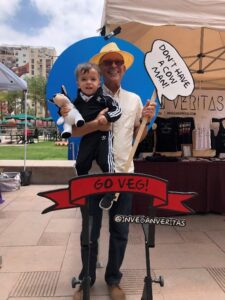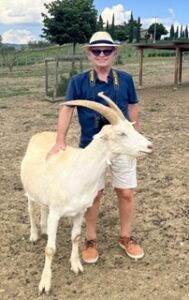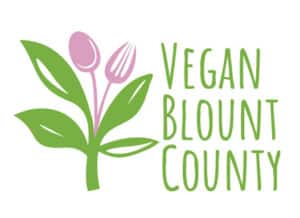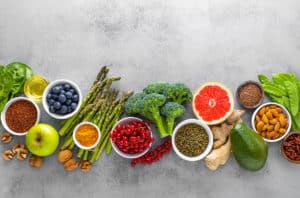Discover how a vegan diet helped me overcome prostate cancer. And the myriad of ways a plant-based lifestyle has transformed me.
My interest in a vegan diet initially was due to having been diagnosed with a serious medical condition more than a decade ago. Subsequently, I became vegan, which has proven to be very helpful in managing my health. Over time, I additionally have grown to appreciate the many other important benefits of a vegan diet.
My Diagnosis: Prostate Cancer
This journey began when I received a diagnosis of prostate cancer. My urologist thought it was serious enough to require surgery, which likely would be followed by additional treatment. When he learned I was reluctant to undergo surgery because of its associated risks, he said I could delay a couple of years by taking medication. I left the office, filled the prescription, read the side effects, and never took it.
How a Vegan Diet Helped Me Overcome Prostate Cancer
 Meanwhile, I remembered a friend with terminal cancer had given my first wife the book, The China Study, by T. Colin Campbell. The book summarizes a rigorous, large-scale study about the relationship between food choices and a wide array of serious diseases. For prostate cancer and every other illness studied, they found a lower prevalence among populations that mostly ate a plant-based diet. The findings were compelling. Unfortunately, my wife received the book too late in her own battle with cancer to benefit from its recommendations, but I read it and proceeded to change my diet. My children already were about to lose one parent to cancer. I felt it was my parental responsibility to make sure they didn’t lose another.
Meanwhile, I remembered a friend with terminal cancer had given my first wife the book, The China Study, by T. Colin Campbell. The book summarizes a rigorous, large-scale study about the relationship between food choices and a wide array of serious diseases. For prostate cancer and every other illness studied, they found a lower prevalence among populations that mostly ate a plant-based diet. The findings were compelling. Unfortunately, my wife received the book too late in her own battle with cancer to benefit from its recommendations, but I read it and proceeded to change my diet. My children already were about to lose one parent to cancer. I felt it was my parental responsibility to make sure they didn’t lose another.
The following month, I went back for a follow-up visit with the urologist. He performed the customary labs used to monitor prostate disease and exclaimed that the medicine was working beautifully. I proceeded to inform him I had never taken it, but I had switched to a whole food, plant-based diet. He responded that there was no scientific evidence to suggest this would work.
Fast forward, now thirteen years later, my most recent prostate biopsy found no evidence of cancer, and my labs came back normal! I will spare you all the details since that initial diagnosis, other than to say I have never received any medical treatment for my cancer.
Doctors Are Not Trained to Recommend a Vegan Diet For Prostate Cancer
My doctor, like most medical practitioners, had little or no knowledge about the powerful effects of nutrition. This is because as, Michael Greger, M.D., explains in, How Not to Die, most physicians receive less than eight hours of nutritional education during their medical training. Even that training is of questionable value because of the lack of scientific evidence for many of today’s nutritional guidelines, as detailed in The China Study.
Fortunately, Greger, Campbell and numerous other medical researchers are making enormous advances in understanding the impact of our food choices upon our health. Their research repeatedly demonstrates that a vegan diet can prevent and even reverse a number of serious illnesses, often more effectively than traditional medicine. It is important to emphasize, however, that this research emphasizes a specific type of vegan diet – one that is plant-based, high in fiber, and consists mostly of whole foods, the type recommended in the “Daily Dozen.”
Daily Dozen InfographicThe Benefits of a Vegan Lifestyle
When I began my vegan journey, I was focused solely upon the health benefits, but along the way, I have come to realize the many additional benefits.
Helping Animals
 One key benefit is avoiding the widespread pain and suffering inflicted on farm animals. Maybe you have seen or read about the heart-wrenching conditions in commercial poultry farms, or the way beef cattle spend the last few months of their lives in feedlots, or the misery endured by dairy cattle every day. So much suffering could be avoided if more people adopted a vegan diet.
One key benefit is avoiding the widespread pain and suffering inflicted on farm animals. Maybe you have seen or read about the heart-wrenching conditions in commercial poultry farms, or the way beef cattle spend the last few months of their lives in feedlots, or the misery endured by dairy cattle every day. So much suffering could be avoided if more people adopted a vegan diet.
Helping the Environment
Another important benefit of vegan diets is the environmental impact. For example, the water required for a four-ounce serving of plant-based protein is only a fraction of the water required to produce a four-ounce serving of beef. Another example is that the methane gas emitted from cows astonishingly is estimated to account for about 10 percent of all global warming. And just imagine if the almost 85 million acres of US farmland used for raising soybeans for livestock (which equals the acreage of all US National parks combined) were instead left in a natural state. The potential environmental impacts of adopting a vegan diet are vast and multi-dimensional.
My Continuing Journey
My vegan journey is far from over. Like most any endeavor, there always is more to learn and better ways to practice it. Whether it be new research findings that can help me with my food choices, new recipes to try, or new offerings I find at the market, my vegan food journey is an active one. I also am thinking of reducing my use of all animal products – honey and other condiments, footwear and clothing choices, home furnishings, upholstery selections, and others. If all of us cut back on our consumption of meat and other animal products just a little, the impacts upon our health, environment and animal well-being would be significant. If all of us became vegan, the impact would be transformational.
READ NEXT
New Vegan Activism Opportunities: Show Your Compassion for Animals
Book Review: The Korean Vegan: Reflections and Recipes from Omma’s Kitchen
Eye-Opening Ways Nature’s Sounds, Smells, and Sights Can Heal You




